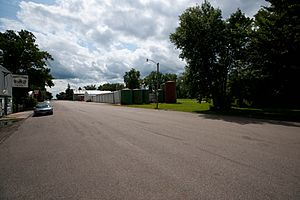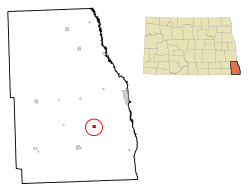Great Bend, North Dakota facts for kids
Quick facts for kids
Great Bend, North Dakota
|
|
|---|---|

Street in Great Bend
|
|

Location of Great Bend, North Dakota
|
|
| Country | United States |
| State | North Dakota |
| County | Richland |
| Founded | 1888 |
| Incorporated (village) | 1908 |
| Incorporated (city) | 1967 |
| Named for | Bend in the Wild Rice River |
| Area | |
| • Total | 0.56 sq mi (1.45 km2) |
| • Land | 0.56 sq mi (1.45 km2) |
| • Water | 0.00 sq mi (0.00 km2) |
| Elevation | 974 ft (297 m) |
| Population
(2020)
|
|
| • Total | 49 |
| • Estimate
(2022)
|
52 |
| • Density | 87.34/sq mi (33.74/km2) |
| Time zone | UTC-6 (Central (CST)) |
| • Summer (DST) | UTC-5 (CDT) |
| ZIP code |
58075
|
| Area code(s) | 701 |
| FIPS code | 38-32900 |
| GNIS feature ID | 1036068 |
Great Bend is a small city in Richland County, North Dakota, in the United States. It is located right next to the Wild Rice River. In 2020, about 49 people lived there. The city was started in 1888. It became an official village in 1908. Great Bend is part of the larger Wahpeton area.
Contents
A Look Back: Great Bend's History
Great Bend was started in 1888. It was built on land that George Worner (1855–1950) had claimed. George Worner was born in Germany. He moved to Brandenburg Township in 1874 with his family. They had moved from Wisconsin.
In 1875, George Worner set up a small post office in the countryside. He called it Berlin, like the capital city of Germany. The post office moved closer to Great Bend in 1882. It closed on July 12, 1883.
Worner was very important in starting and growing the town. He was one of the first station agents for the Northern Pacific Railroad. He also ran the town's first general store. He was one of the first postmasters too. Later, he became a politician. He served in the North Dakota House of Representatives.
Great Bend's Location
Great Bend is located in North Dakota. According to the United States Census Bureau, the city covers about 0.55 square miles (1.45 square kilometers). All of this area is land. There is no water within the city limits.
How Many People Live Here?
| Historical population | |||
|---|---|---|---|
| Census | Pop. | %± | |
| 1910 | 191 | — | |
| 1920 | 142 | −25.7% | |
| 1930 | 169 | 19.0% | |
| 1940 | 198 | 17.2% | |
| 1950 | 169 | −14.6% | |
| 1960 | 164 | −3.0% | |
| 1970 | 86 | −47.6% | |
| 1980 | 113 | 31.4% | |
| 1990 | 108 | −4.4% | |
| 2000 | 118 | 9.3% | |
| 2010 | 60 | −49.2% | |
| 2020 | 49 | −18.3% | |
| 2022 (est.) | 52 | −13.3% | |
| U.S. Decennial Census 2020 Census |
|||
Population in 2010
In 2010, the census showed that 60 people lived in Great Bend. There were 29 homes, and 17 of these were families. The city had about 109 people per square mile. Most people living in the city (100%) were White.
About 17% of homes had children under 18 living there. More than half (51.7%) were married couples. Some homes had a single parent. About 34.5% of all homes were individuals living alone. Some people aged 65 or older lived by themselves.
The average age in the city was 52.5 years old. About 18% of residents were under 18. About 20% were 65 or older. The number of males and females was about the same.
Important Person from Great Bend
- George Worner (1855–1950): He was the person who founded the town. He also served as a state Congressman from 1925 to 1932.
See also
 In Spanish: Great Bend (Dakota del Norte) para niños
In Spanish: Great Bend (Dakota del Norte) para niños
 | Georgia Louise Harris Brown |
 | Julian Abele |
 | Norma Merrick Sklarek |
 | William Sidney Pittman |

